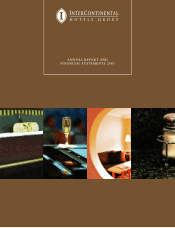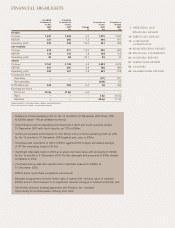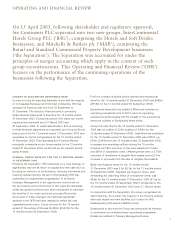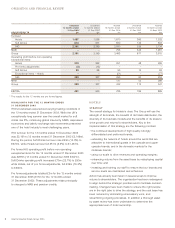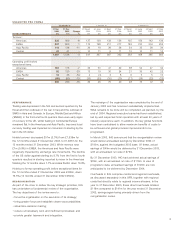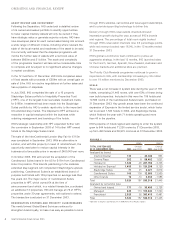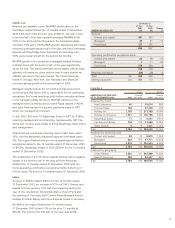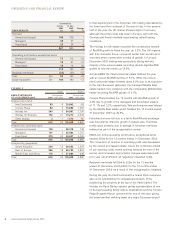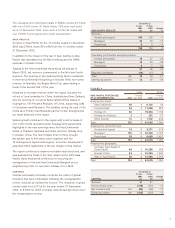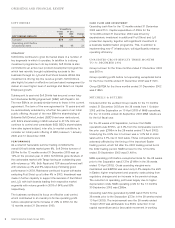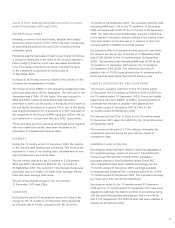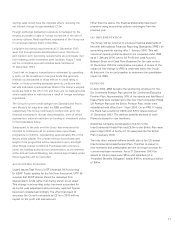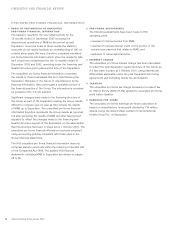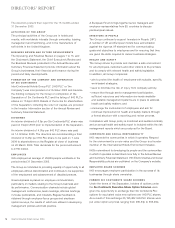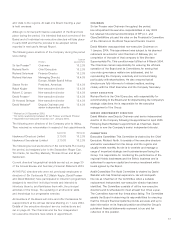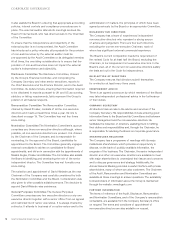Holiday Inn 2003 Annual Report Download - page 10
Download and view the complete annual report
Please find page 10 of the 2003 Holiday Inn annual report below. You can navigate through the pages in the report by either clicking on the pages listed below, or by using the keyword search tool below to find specific information within the annual report.
STRATEGY
Soft Drinks continues to grow its market share in a number of
key segments in which it operates. In addition to a strong
investment programme in its key brands, Soft Drinks is also
committed to an active new product development programme,
which has recently brought outstanding success to the
business through its J2O and Fruit Shoot brands. Whilst this
investment is driving top line revenue growth, Soft Drinks is
also highly focused on effective cost and asset management to
deliver an even higher level of earnings and Return on Capital
Employed growth.
Subsequent to year end Soft Drinks has secured a new long-
term Exclusive Bottling Agreement (‘EBA’) with PepsiCo Inc.
The new EBA is on broadly similar terms to those in the current
agreement. The term of the new agreement is 15 years and will
be automatically extended by a further five years on an initial
public offering. As part of the new EBA the shareholding of
Britannia Soft Drinks Limited (‘BSD’) has been restructured,
with IHG’s shareholding in BSD reduced to 47.5%. IHG will
continue to control and consolidate BSD. BSD’s shareholders
have also agreed subject, inter alia, to market conditions, to
consider an initial public offering of BSD, between 1 January
2005 and 31 December 2008.
PERFORMANCE
As a result of favourable summer trading conditions the
overall UK soft drinks market grew 8%. Soft Drinks turnover of
£674m for the 12 months ended 31 December 2003 was up
10% on the previous year. In 2003, Soft Drinks grew its share of
the carbonates market with Tango having an outstanding year,
with volumes up 14%. Both Pepsi and 7UP also performed well
with volumes up 3% and 6% respectively. Following good
performance in 2002, Robinsons continued to grow with sales
excluding Fruit Shoot up a further 4% in 2003. Investment was
made in further capacity to support the success of Fruit Shoot
and J2O, with both brands leading their respective market
segments with volume growth in 2003 of 54% and 95%
respectively.
The business continued its focus on effective cost control,
which contributed to an overall pro forma operating profit
before exceptional items increase of 22% to £83m for the
12 months ended 31 December 2003.
CASH FLOW AND INVESTMENT
Operating cash flow for the 12 months ended 31 December
2003 was £71m. Capital expenditure of £55m for the
12 months ended 31 December 2003 was driven by
expansionary investment in additional Fruit Shoot and J2O
production capacity, together with significant investment in
a business transformation programme. This, in addition to
implementing new IT infrastructure, will significantly enhance
operating efficiency.
UNAUDITED GROUP RESULTS THREE MONTHS
TO 31 DECEMBER 2002
Group turnover for the three months ended 31 December 2002
was £871m.
Group operating profit before non-operating exceptional items
for the three months ended 31 December 2002 was £112m.
Group EBITDA for the three months ended 31 December 2002
was £186m.
MITCHELLS & BUTLERS
Included within the audited Group results for the 15 months
ended 31 December 2003 are the 28 weeks from 1 October
2002 until the Separation on 15 April 2003 of MAB operations.
For the 12 months ended 30 September 2002 MAB results are
for the full fiscal year.
For the 28 weeks until Separation, turnover from MAB
operations was £793m, up 0.9% from the comparable period in
the prior year (£786m in the 28 weeks ended 13 April 2002).
Underlying the 0.9% rise in turnover was a 1.0% fall in drink
sales and a 2.7% rise in food sales. These comparisons were
adversely affected by the timing of the important Easter
trading period, which fell after the 2003 trading period but in
the 2002 trading period. MAB turnover for the 12 months
ended 30 September 2002 was £1,481m.
MAB operating profit before exceptional items for the 28 weeks
prior to the Separation was £137m (£146m in the 28 weeks
ended 13 April 2002). Gross operating margins were
maintained and EBITDA was down only 0.5% despite the shift
in Easter, higher employment and property costs arising from
regulatory changes and an increase in the pension charge.
The reduction in operating profit was largely due to higher
depreciation costs. MAB operating profit for the 12 months
30 September 2002 was £289m.
Operating cash flow generated by MAB was £152m for the
28 weeks prior to the Separation (£72m in the 28 weeks ended
13 April 2002). The improvement over the 28 weeks ended
13 April 2002 was attributable to a £64m reduction in net
capital expenditure and a favourable movement in working
OPERATING AND FINANCIAL REVIEW
8InterContinental Hotels Group 2003
12 months to
31 Dec 31 Dec
2003 2002 Change
SOFT DRINKS RESULTS £m £m %
Tur nover 674 611 10
Operating profit before
exceptional items 83 68 22
SOFT DRINKS

